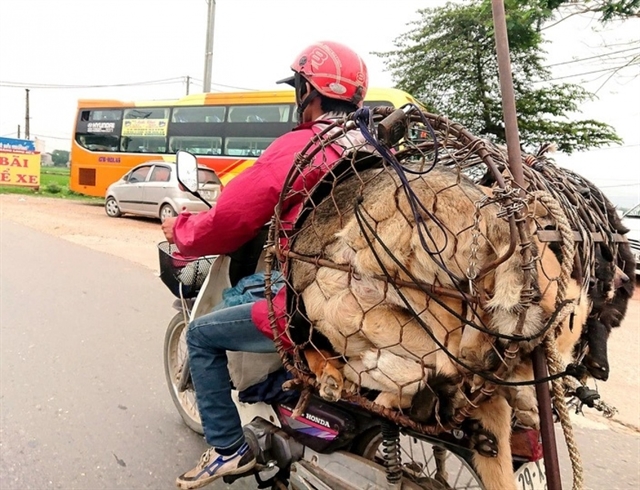.jfif) Opinion
Opinion

 |
| A man drives dogs on the outskirts of Hà Nội to a slaughterhouse. Photo tuoitre.vn |
Voice of Việt Nam (VOV) speaks to experts on the pilot programme to turn Hà Nội into a city free of dog and cat meat.
Dog and cat meat trading is heavily frowned upon by tourists. What is your comment on the plan of making Hà Nội a dog and cat meat-free city?
Associate Professor Lê Văn Nam, member of Việt Nam Veterinary Association:
I think this is a major policy, not only for Hà Nội but across the country in the long run. In European and American countries, they see that eating dog and cat meat is disgusting because dogs are people's friends, are intelligent and have developed alongside humans for thousands of years.
To achieve the goal of saying no to dog and cat meat, we need appropriate solutions in the long run.
From a traditional perspective, dog meat has been a favourite dish of many Vietnamese people. Consuming dog meat has become a habit and was widespread in the daily life of our country in some specific periods, especially during the war.
It is said that dog meat helps build strong bones, healthy kidneys and increase muscle strength. Therefore, it is extremely difficult to ban dog meat slaughtering and trading immediately as many people, particularly in rural areas, still think like this.
According to the World Health Organization, the consumption of dog meat poses potential threats to public health and increases the risk of infectious diseases such as toxoplasmosis and cholera. A lot of solutions have been proposed to eliminate dog and cat meat consumption. What do you think about this?
Assoc. Prof. Lê Văn Nam:
To realise the major goal, we need a series of solutions depending on social development.
Banning the release of dogs is an urgent and absolutely appropriate solution, especially when our country still records unfortunate cases of people being bitten by rabid dogs every year. Other solutions such as banning dog trading and slaughtering are our long-term goals.
As society becomes more developed and civilised, it will be easier to eliminate dog meat consumption. Public perception will gradually change, but we need to wait a long time for this.
I think it is possible to limit the consumption of dog meat if we keep up communication campaigns.
Nguyễn Ngọc Tiến, a researcher in Hà Nội:
Today the habit of eating dog and cat meat is now not as popular as before. The perception of some groups has changed, especially young people who love animals. However, stores selling dog and cat meat still exist. If there is a demand, there will still be a supply.
There are differences between the concepts of Eastern and Western peoples. Easterners consider dogs to be edible while Westerners think that dogs are pets and friends and would feel guilty eating them.
This is not a matter of being civilised or not. It is a never-ending argument.
It can only be said that eating animals that are close to us every day is not advisable. It is more reasonable to encourage and educate people not to eat dog meat while working towards the eventual eradication of the habit.
Legally speaking, it is difficult to ban dog and cat meat consumption. Why can people eat other animals but not dogs and cats? People can eat what they like as long as they don't break the law.
In my personal opinion, it is better to run communication and education campaigns so that people can limit and gradually abandon dog and cat consumption, rather than imposing administrative sanctions. That would be consistent with a society that increasingly respects individual liberties. VNS